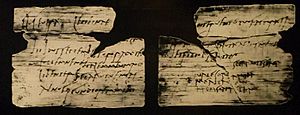Claudia Severa facts for kids
Claudia Severa was a Roman woman who lived around 100 AD. She was married to Aelius Brocchus, who was a commander of a fort near Vindolanda in northern England. Claudia Severa is famous because of a special birthday invitation she sent to her friend, Sulpicia Lepidina. Sulpicia Lepidina was the wife of Flavius Cerialis, the commander at Vindolanda.
This invitation was written in ink on a thin wooden tablet. It was found in the 1970s and is one of the most well-known items from the Vindolanda Tablets. These tablets are important because they give us a glimpse into daily life in the Roman Empire.
The first part of the letter was written by a professional scribe, someone who was paid to write letters. But the last four lines were added in a different handwriting, which experts believe was Claudia Severa's own writing. This makes it very special!
Contents
Claudia Severa's Birthday Invitation
Here is a simple translation of the birthday invitation:
- Claudia Severa sends greetings to her dear Lepidina.
- Sister, on September 11th, for my birthday celebration, I warmly invite you to come to us. Your visit would make the day much more enjoyable for me, if you are able to be here. Please give my greetings to your Cerialis. My Aelius and my little son also send their greetings to him.
- (Added in Claudia's own hand) I will be waiting for you, sister. Farewell, sister, my dearest soul. I hope you are well, and hail!
This letter shows us that Roman women like Claudia Severa were educated and could write. It also shows that they kept in touch with their friends, even across different forts.
Oldest Writing by a Woman
The Vindolanda Tablets also have a small piece of another letter written by Claudia Severa. These two letters are thought to be the oldest surviving writings by a woman in Latin found in Britain. They might even be the oldest found anywhere!
These letters tell us that Claudia and Lepidina wrote to each other often. They also visited each other regularly. We don't know exactly which fort Claudia Severa lived in, but it was close to Vindolanda.
A Special Friendship
Claudia Severa's letters show a strong friendship. Even though she probably wasn't related to Sulpicia Lepidina, she often called her "sister." She used words that showed how much she enjoyed Lepidina's company. For example, she used the word iucundus, which means "pleasant" or "enjoyable," to describe how happy Lepidina's visit would make her.
In the part she wrote herself, Claudia Severa used words that remind us of famous Roman poems. For instance, the Roman poet Virgil wrote about a character being a "sister sharing a soul." Claudia's words, "my dearest soul," sound similar. This suggests that even everyday letters could have a touch of poetry or be influenced by popular literature of the time.
The word Claudia chose for her birthday party, sollemnis, is also interesting. It means "ceremonial" or "solemn." This suggests that her birthday was an important yearly event, possibly with religious meaning.
Display of the Letter
The birthday invitation tablet was bought by the British Museum in 1986. It is now part of their collection. The museum displays some of the Vindolanda Tablets, and they also lend some to the museum at Vindolanda. This means you can sometimes see these amazing pieces of history in person!
 | Frances Mary Albrier |
 | Whitney Young |
 | Muhammad Ali |


